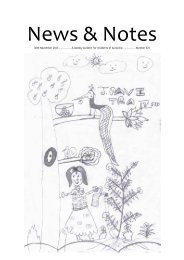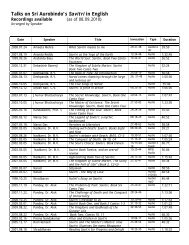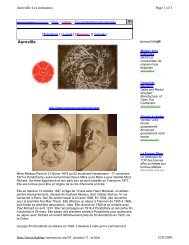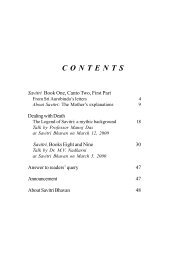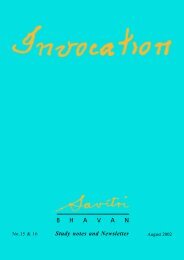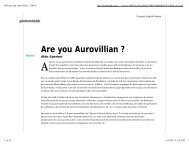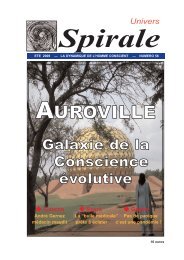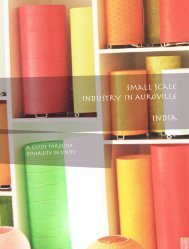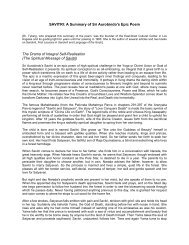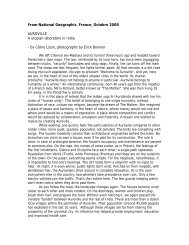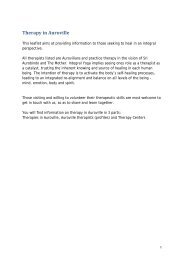English - Auroville
English - Auroville
English - Auroville
You also want an ePaper? Increase the reach of your titles
YUMPU automatically turns print PDFs into web optimized ePapers that Google loves.
<strong>Auroville</strong><br />
<strong>Auroville</strong> is a planned city for up to 50,000 people from around the world under development in south-east India, located<br />
close to the Coromandel Coast some 10 kms north of Puducherry and 150 kms south of Chennai.<br />
Aspects of <strong>Auroville</strong> can be found in other communities and projects around the world, but <strong>Auroville</strong> is the world's first and<br />
only internationally-recognised centre for research in human unity, which is also concerned with – and practically researching<br />
into – humanity’s future cultural, environmental, social and spiritual needs. Its global importance is emphasised by the fact that it<br />
has been endorsed by UNESCO, and enjoys the full support and encouragement of the Government of India, its host nation,<br />
which has approved its Master Plan.<br />
History<br />
The concept of an international-universal city devoted to an experiment in human unity originally sprang from the writings of<br />
India's great philosopher-yogi Sri Aurobindo. However, it was his French-born spiritual collaborator and co-worker Mirra<br />
Alfassa, known as The Mother, who first gave it more concrete form, by naming it '<strong>Auroville</strong>' and stating:<br />
"<strong>Auroville</strong> wants to be a universal town where men and women of all countries are able to live in peace and progressive<br />
harmony, above all creeds, all politics and all nationalities. The purpose of <strong>Auroville</strong> is to realise human unity."<br />
This was the first public statement on <strong>Auroville</strong>, given out in 1965. Next, in 1966, the concept of <strong>Auroville</strong> was put before the<br />
General Assembly of UNESCO by the Indian Government, and was unanimously endorsed. Two years later, on 28th February<br />
1968, youth representing 124 nations and all the Indian States came together to inaugurate the township and receive its<br />
Charter, which reads as follows:<br />
1. <strong>Auroville</strong> belongs to nobody in particular. <strong>Auroville</strong> belongs to humanity as a whole. But to live in <strong>Auroville</strong> one must<br />
be the willing servitor of the Divine Consciousness.<br />
2. <strong>Auroville</strong> will be the place of an unending education, of constant progress, and a youth that never ages.<br />
3. <strong>Auroville</strong> wants to be the bridge between the past and the future. Taking advantage of all discoveries from without<br />
and from within, <strong>Auroville</strong> will boldly spring towards future realisations.<br />
4. <strong>Auroville</strong> will be a site of material and spiritual researches for a living embodiment of an actual Human Unity.<br />
At the same time UNESCO repeated its unanimous endorsement of the project, and did so again in 1970 and 1983.<br />
In 1988 the project was given special status by the Government of India, when the ‘<strong>Auroville</strong> Foundation’ was created by Act of<br />
Parliament. There are three separate but interacting bodies which make up the Foundation – a Governing Board with Secretary<br />
resident in <strong>Auroville</strong>, an International Advisory Council, and a Residents Assembly, the latter comprising all Aurovilians on the<br />
Master List of residents aged 18 or over.<br />
The site chosen for <strong>Auroville</strong> was a severely eroded plateau extending eastwards to the sea. An early priority for the project<br />
was the environmental regeneration and reafforestation of the area, which in the late 1960s had been officially described in a<br />
Government report as being in "an advanced state of desertification." Tens of thousands of trees and shrubs were planted (to<br />
date over 2 million) and erosion control begun, with the result that the area now has a green and widely forested landscape.<br />
Alongside this work, emphasis has always been placed on development of the city using non-polluting appropriate technology<br />
and sustainable energy generating systems.<br />
<strong>Auroville</strong> today<br />
The Master Plan for the township, approved by the Government of India, is based on a spiral galaxy shape and incorporates<br />
four radiating sectors (the International, Cultural, Industrial and Residential Zones) plus a surrounding Green Belt. The four<br />
Zones have as their focus a huge 29m high x 36m diameter globe-shaped structure at the centre of the township called the<br />
Matrimandir, the ‘soul of the city’, a place for silent concentration which will be surrounded by an area of beautiful gardens.<br />
The constantly expanding <strong>Auroville</strong> community today numbers over 2,200 residents from some 47 countries. They live in<br />
100+ settlements of varying size and character, established on areas of <strong>Auroville</strong> land interspersed with village land over a total<br />
area of 20 square kilometres. They are engaged in diverse activities, in the fields of agriculture & green work, renewable<br />
energy, education, health care, village-outreach, construction, electronics, commerce, the arts and administration. All are<br />
volunteers who either receive a monthly basic ‘maintenance’ in local rupees, or pay for themselves partly or entirely from their<br />
own private resources as a contribution to the project.<br />
General financing for <strong>Auroville</strong> comes from five sources – the Government of India and NGOs within India and abroad; 24<br />
<strong>Auroville</strong> International Centres and Liaison Offices around the world; a percentage of the profits of <strong>Auroville</strong>’s many commercial<br />
/ business units; individual friends of <strong>Auroville</strong> within India and abroad; and substantially from the Aurovilians themselves.<br />
<strong>Auroville</strong>'s significance and outreach<br />
<strong>Auroville</strong>'s work is not confined only to meeting the needs of the township, or to those of the wider bio-region. <strong>Auroville</strong> sees<br />
itself as a place of research and experimentation for humanity as a whole, not only into sustainable practices – such as in the<br />
fields of agriculture and energy generation – but more importantly into the establishment for the first time on earth of a society<br />
based on practical human unity applicable to all people and all nations. As such it is a unique and important experiment, rolemodel<br />
and potential catalyst for changing global perceptions, lifestyles and practices for the benefit of all humanity,<br />
independently of political, religious, ethnic or cultural influences.<br />
<strong>Auroville</strong> has already gained national and international acclaim for its environmental work. Many hundreds of acres of forest<br />
cover have been created; indigenous flora and fauna have been re-introduced or have returned naturally; tree seedling<br />
nurseries have been established; and comprehensive soil and water conservation practices have been introduced. The<br />
development of ecologically-sound agriculture without the use of pesticides and detrimental chemicals, plus application of upto-date<br />
agro-forestry techniques, is also being actively pursued.<br />
<strong>Auroville</strong> has a well-organised waste recycling system, and is actively trying to raise awareness of the need to reduce and<br />
recycle waste throughout the whole <strong>Auroville</strong> area.
Alongside all this, <strong>Auroville</strong>’s coordination of a major project to desilt and renovate the complex of artificial lakes (known<br />
locally as tanks) associated with the villages in the area, with the aim of improving their water holding capacity and helping to<br />
stabilise water tables, won a National Groundwater Augmentation Award. <strong>Auroville</strong> is also involved in raising awareness of the<br />
dangers of salt intrusion in the immediate coastal zone caused by over-pumping of ground water; is working with farmers’<br />
associations to identify and introduce less water-dependent agricultural practices; and is advising on and promoting the use of<br />
effective micro-organism (EM) technology.<br />
The Centre for Scientific Research, an institution recognised and approved by the Government of India since 1984 for its<br />
development work in appropriate technology – in particular for its use of ferrocement technology for buildings – is another focal<br />
point for future-oriented activities, together with the <strong>Auroville</strong> Earth Institute (AEI). The latter is part of a national network of over<br />
450 such centres initiated by the Housing and Urban Development Corporation of India (HUDCO). AEI provides regular training<br />
programmes, offers consultancy, designs buildings, supervises construction incorporating its own cost-effective compressed<br />
earth brick technology, and is headed by the representative for India & South Asia to the UNESCO Chair of Earthen<br />
Architecture. In 1992 it won the Hassan Fathy International Award for Architecture for the Poor; in 1995 it received an<br />
Outstanding Performance Award from HUDCO for its activities; and in 1994 and '95 it was recognised by India’s Ministry of<br />
Urban Development as the Best Building Centre in India.<br />
Another interesting institution is the <strong>Auroville</strong> Institute of Applied Technology (AIAT), a non-profit training school serving<br />
students from the local villages. The vision of the Institute is in line with the UN’s Millennium Development Goals and is targeted<br />
at eradication of poverty and the socio-economic inequity among youth and families in disadvantaged coastal and rural<br />
communities in the bio-region, by raising the employability of youth of both genders and empowering them to contribute to<br />
India’s economic growth by way of skill training and personal development.<br />
The most recent major outreach work undertaken by Aurovilians has been overseeing the transformation of Pondicherry’s<br />
Bharati Park, restoration of historical buildings in Tranquebar, and the restoration of Adyar Creek in Chennai into a healthy and<br />
environmentally sustainable nature reserve of great inspirational and educational value to the region. .<br />
Education<br />
<strong>Auroville</strong>'s multi-cultural educational system endeavours via its six schools to help each child to discover the inner self and<br />
realise her / his highest potential. It is increasingly based on a free choice system, which allows the children / students to<br />
choose their own subjects for study. Meanwhile, sports and physical education are also strongly encouraged for the balanced<br />
and healthy growth of the child, plus artistic training to develop aesthetic faculties.<br />
In addition to the children of <strong>Auroville</strong>, some 700 children from the surrounding villages benefit from <strong>Auroville</strong>'s educational<br />
programmes via another half dozen day or night schools established and overseen by <strong>Auroville</strong>.<br />
Arts and culture<br />
There are regular film shows in <strong>Auroville</strong>, plus occasional theatre, music, dance and choir performances, poetry readings,<br />
exhibitions, powerpoint presentations, lectures, etc, normally free to residents and guests. 2011 also saw the second of the<br />
biennual <strong>Auroville</strong>Film Festival mounted in collaboration with schools in <strong>Auroville</strong> and its wider bioregion..<br />
Health<br />
Together with allopathy and dentistry, provided for both Aurovilian and village patients, many systems of alternative primary<br />
health care are in use, including homeopathy, ayurveda, physiotherapy, acupuncture, massage and other therapies via various<br />
centres in the city. The <strong>Auroville</strong> Health Centre, equipped with basic medical facilities, serves the <strong>Auroville</strong> community and<br />
around 200 local patients daily via its main building and 7 village-located sub-centres. More than 30 local women health<br />
workers, trained by <strong>Auroville</strong>, are also active in 17 nearby villages, giving first-aid, advising on home cures, providing basic<br />
health education, and encouraging better nutrition by way of small family gardens in the villages.<br />
The construction of a centrally located Integral Health Centre for <strong>Auroville</strong> is in process.<br />
Commercial activities<br />
Some 125 commercial units and 70 service units operate in <strong>Auroville</strong>. The activities of the former include handicrafts,<br />
graphic design and printing, food processing, electronics and engineering, metalworking, windmill production, clothing and<br />
fashion, computer services, building construction and architecture.<br />
These units, which contribute a third or more of their profits to the ongoing development of the township, have an important<br />
role to play in achieving eventual self-sufficiency for <strong>Auroville</strong>. Meanwhile, besides generating funds to assist the community in<br />
maintaining its basic services and infrastructure, the units also provide employment and training for large numbers of local<br />
villagers, enabling them to improve their standard of living and acquire valuable skills in a fair trade context. At present, some 4to-5,000<br />
local people are employed in <strong>Auroville</strong>, with considerable financial benefits to the surrounding area.<br />
Organisation<br />
Bodies like the ‘<strong>Auroville</strong> Council’ and 'Working Committee' are elected every 4 years from volunteers willing to dedicate<br />
themselves to meeting the basic administrative needs of the township, but have no on-going power. Most major decisions,<br />
specially of a controversial nature, are taken at Residents Assembly or General Meetings, where all Aurovilians and<br />
Newcomers are equally free to express themselves. For the day to day running of the township, working groups pertaining to<br />
specific fields enjoy autonomy in their decision making.<br />
Summary<br />
<strong>Auroville</strong> represents a real hope for the future of humanity, as the only place on earth where an ongoing non-political multinational<br />
experiment in human unity is under way on behalf of all mankind, alongside other important work. The project has<br />
been steadily growing in size and scope for over 43 years now, and continues to do so with increasing momentum.<br />
For further information on <strong>Auroville</strong> please access the website www.auroville.org or contact: OutreachMedia,<br />
Multimedia Centre, <strong>Auroville</strong> 605101, Tamil Nadu, INDIA; outreachmedia@auroville.org.in (January 2012)



